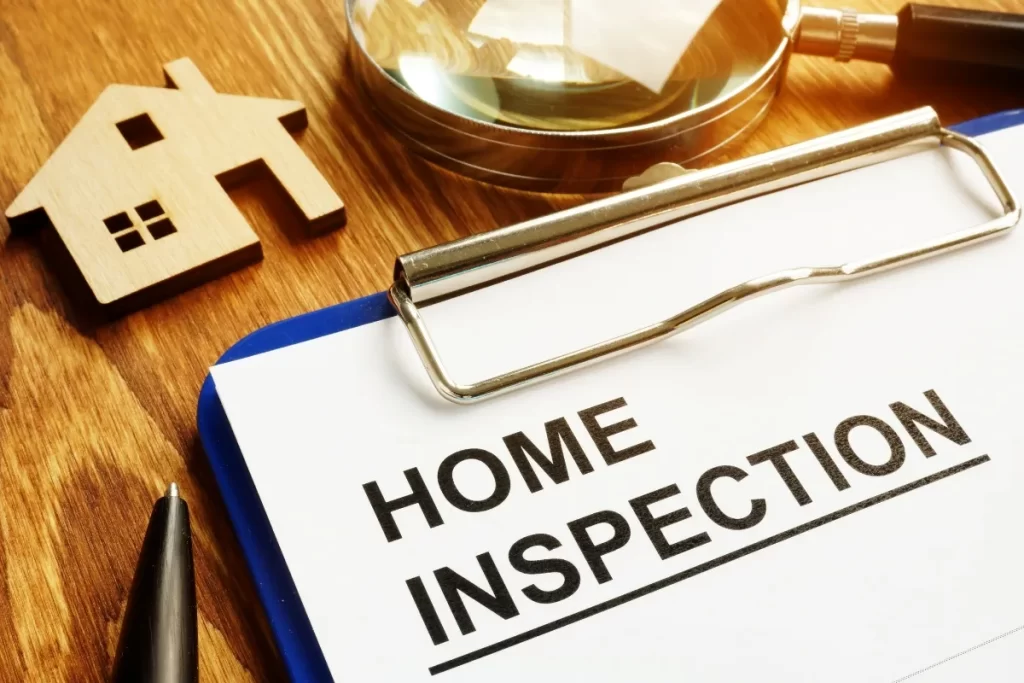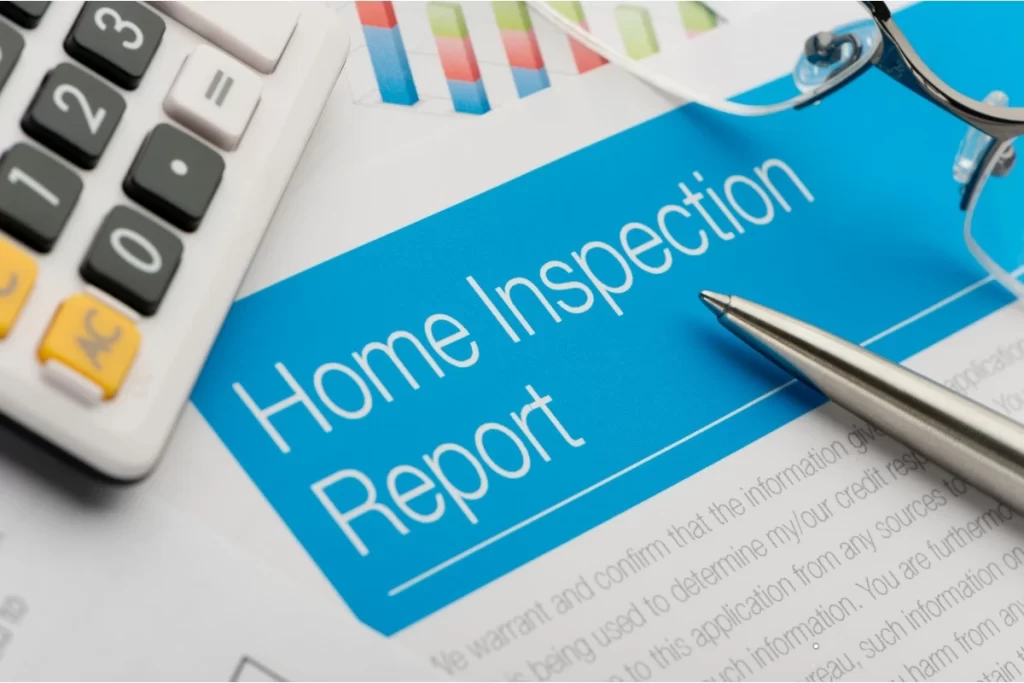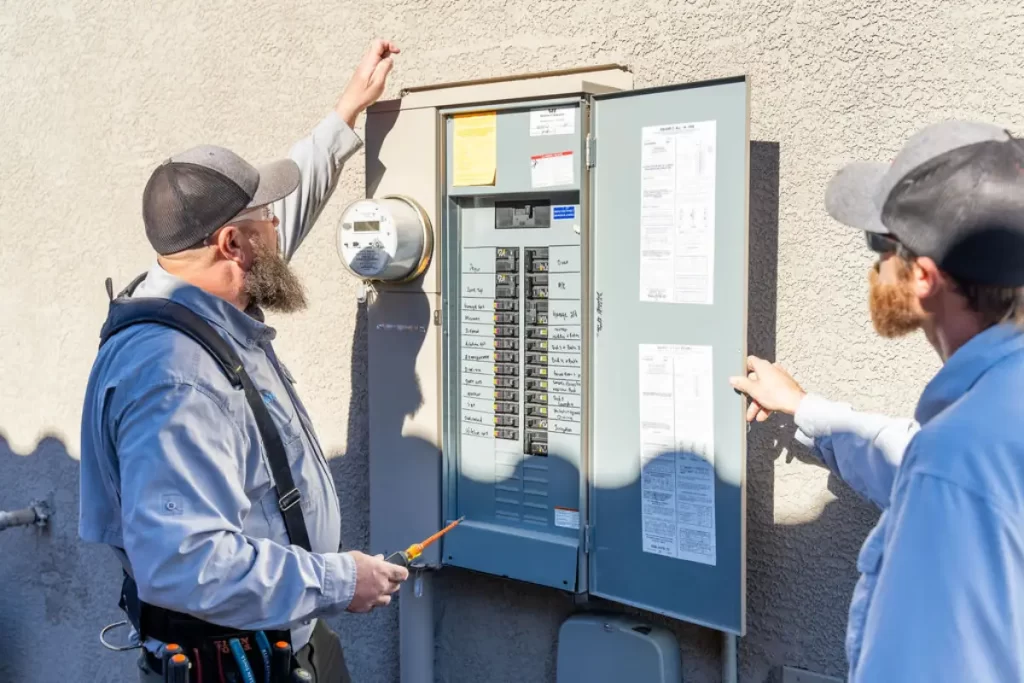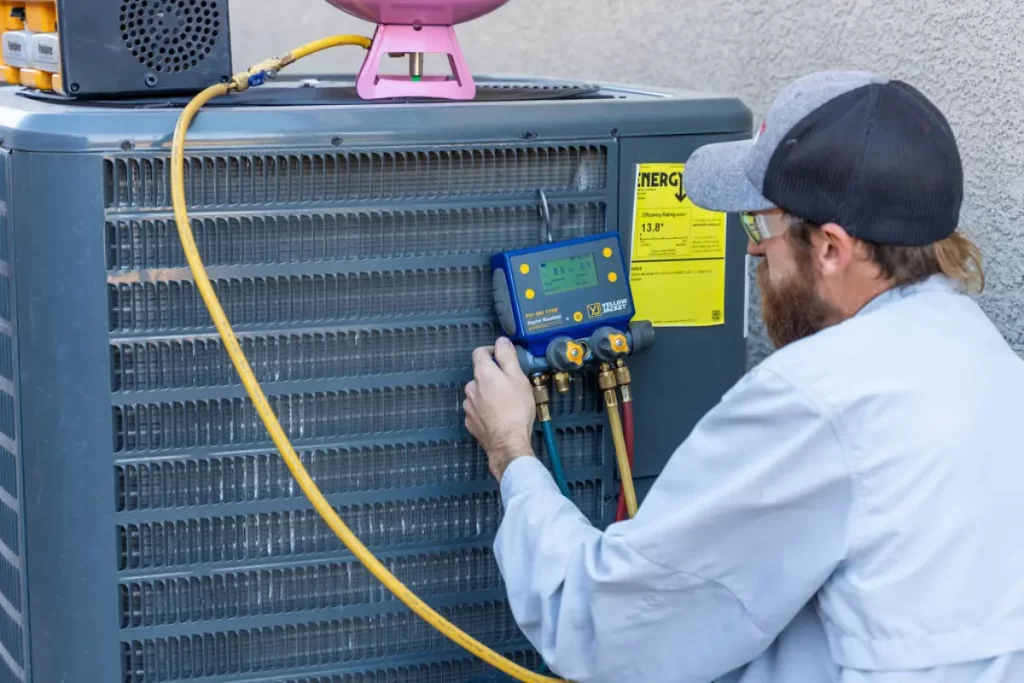
- Home Inspector Selection: Choose a qualified home inspector by researching their credentials, experience, and reviews. Don’t solely rely on real estate agent recommendations.
- Inspection Coverage: Expect the inspection to include assessments of structural components (like the foundation, walls, and roof), exterior features (such as siding and windows), interior features (including walls and floors), plumbing, electrical systems, and HVAC systems.
- Plumbing and Electrical Check: The inspector will test all faucets, check for leaks, ensure proper functioning of electrical outlets, and verify compliance with safety standards.
- HVAC Evaluation: Inspectors assess the operation and efficiency of HVAC systems but may not identify all issues. Consider hiring a specialist for a detailed evaluation.
- Safety and Future Concerns: Look for mentions of immediate safety issues (like carbon monoxide and gas leaks) and future concerns (such as the age and condition of the water heater or HVAC system).
- Report Interpretation: The report will detail each area with numbered items, often accompanied by photos. It will distinguish between major and minor issues, and suggest whether specialized inspection is needed.
- Using the Report in Negotiations: Utilize the report to negotiate repairs or price adjustments, focusing on significant and costly issues like foundation cracks, aging systems, or safety hazards.
- Long-Term Planning: Use the report as a guide for future home maintenance and upgrades, especially for systems that are functional but aging.
Buying a home is a big step, and understanding the home inspection process is crucial.
A detailed home inspection can reveal the true condition of your potential new home, going beyond the surface to examine essential aspects of the property. This includes the strength of the structure, the state of the roof, walls, and foundation, as well as key systems like plumbing and electrical.
Knowing the cost of a home inspection and what to expect can greatly help you in making an informed decision. During an inspection, expect a thorough assessment of both the interior and exterior of the home.
This means checking the siding, windows, doors, and even outdoor areas like patios or decks. Inside, inspectors will look at walls, ceilings, floors, and stairways for any signs of damage or defects. They also focus on the functionality and safety of the plumbing and electrical systems.
But what exactly does a home inspector look for?
They will be running every faucet, checking all electrical outlets, and ensuring that all systems meet current safety standards. They will examine the HVAC system as well, though it’s worth noting that some aspects may require a specialist’s assessment for a complete evaluation.
As you go through the home inspection report, it’s important to understand how to interpret the findings.
The report will list details about each area of the home, categorizing issues as major or minor and sometimes recommending further professional evaluation. This guide aims to demystify the home inspection process for you, breaking down the costs, what’s included in the checklist, and how long the process takes, so you can navigate your home-buying journey with confidence and ease.
Be sure to check out our “Ask the Trade Pros” podcast episode, where Jordan and Todd offer their expert insights on home inspections, providing valuable advice for prospective home buyers.
For specialized services in HVAC, plumbing, or electrical systems in the Tucson area, particularly following a home inspection, contact Done Rite Services at 520-369-3966.
Our team offers expert assessments and repairs, ensuring that the critical systems in your new home are in top condition, aligning perfectly with your home inspection results. For example, if you need a residential ac installation or professional ac repair service, we’ve got you covered.
Table of Contents
Choosing the Right Home Inspector: Tips and Tricks
When you’re on the brink of buying a home, selecting the right home inspector is as vital as the inspection itself. This is the person who will provide you with a clear picture of the property’s condition, so it’s important to choose wisely. Remember, not all inspectors have the same level of skill or attention to detail.
Start by doing some research. Look for inspectors with solid credentials and a good track record. How long have they been in the business? What kind of training have they had? These are crucial questions. Don’t hesitate to ask for certifications or qualifications. A reputable inspector won’t mind sharing this information.
Reading reviews and getting recommendations can be very helpful. Look for feedback from previous clients to gauge the inspector’s thoroughness and reliability. This can give you an insight into what to expect from their service.
Also, communication is key. A good home inspector should be willing to discuss their findings with you in detail. They should be clear about what they check during the inspection, including structural components, exterior and interior elements, and crucial systems like plumbing, electrical, and HVAC. Knowing their approach can help you understand the depth of their inspection process.
Finally, don’t just go with the first name your real estate agent suggests. While their recommendations can be a starting point, doing your own research ensures you find an inspector who aligns with your specific needs. Remember, this is about protecting your future investment. Taking the time to choose the right inspector can save you from unforeseen issues and expenses down the line.
What’s Included in a Home Inspection Report

Understanding what’s included in a home inspection report is essential for any prospective homebuyer. This report is your window into the house’s condition, providing detailed insights that go beyond just surface-level observations.
Structural Components: One of the primary focus areas of a home inspection is the structural integrity of the property. Inspectors look at the foundation, walls, roof, and floors. They check for signs of wear or damage that could affect the house’s safety and stability. This includes looking for cracks in the foundation or signs of water damage on the ceilings and walls.
Exterior Evaluation: The exterior of the house is just as important as the inside. Inspectors examine siding, windows, doors, and any outdoor structures like decks and patios. They also look at gutters and downspouts to ensure proper drainage. The goal is to identify any issues that could lead to problems, like water intrusion or structural damage.
Interior Inspection: Inside the house, inspectors are thorough. They check walls, ceilings, floors, and stairs for any signs of damage. This includes looking for cracks, water stains, and other indicators that might suggest underlying issues. Inspectors also assess doors and windows for proper operation and fit.
Plumbing System: Plumbing is a critical part of any home inspection. The inspector checks for leaks and assesses the condition of pipes, faucets, and toilets. They also test water pressure to ensure it’s at a suitable level. A proper plumbing inspection can reveal issues like old pipes that might need replacing or minor leaks that could turn into major problems.
Electrical System: Safety is paramount when it comes to the electrical system. Inspectors examine the electrical panel, outlets, and switches. They ensure everything is up to code and functioning safely. This includes checking for outdated wiring or overloaded circuits, which can pose serious fire hazards.
HVAC System: The heating, ventilation, and air conditioning (HVAC) system is also a key part of the inspection. Inspectors check the system’s operation and efficiency. They look for any signs of maintenance issues or potential problems. However, remember that while inspectors can identify obvious issues, they might not catch everything, especially internal system problems that would require a specialist’s assessment. For a more in-depth look at what a comprehensive HVAC inspection entails, you might want to consider an affordable HVAC inspection from a specialist.
Each area of the home is meticulously reviewed to give you a comprehensive understanding of what you’re potentially buying. The home inspection report will list all findings, often with photos, and categorize issues based on their severity. Understanding these details can help you make informed decisions and potentially negotiate repairs or price adjustments.
Plumbing and Electrical: Critical Aspects of Home Inspections
A home inspection dives deep into the critical systems of a house, with special attention paid to plumbing and electrical setups. These systems are essential for a safe, functional home, so understanding what the inspection covers in these areas is key.
Plumbing Inspection: When it comes to plumbing, inspectors perform a thorough check. They test every faucet, from the kitchen to the bathrooms, ensuring that all are running properly with adequate water pressure. They look for any signs of leaks, not just in the obvious places like under sinks, but also in less visible areas. Toilets are flushed to make sure they are functioning correctly and not backing up. Inspectors also assess the condition of the pipes, checking for any signs of aging or damage. This comprehensive check helps identify any current or potential plumbing issues that could lead to costly repairs if not addressed.
Electrical System Check: Electrical inspections are all about safety and compliance. Inspectors examine the electrical panel closely, checking for any outdated wiring or safety concerns. They test outlets and switches throughout the house to ensure they are working correctly and safely. Light fixtures are also inspected. One key aspect is verifying that the home’s electrical system complies with current safety standards. This might include checking for the presence and functionality of Ground Fault Circuit Interrupters (GFCIs) in areas like bathrooms and kitchens, where the risk of electric shock is higher due to the presence of water.

Both plumbing and electrical inspections are vital in evaluating the overall condition and safety of a home. Issues in these areas can be expensive to fix and may pose significant risks if left unaddressed. By thoroughly examining these systems, the home inspector provides valuable information that can guide your decisions, whether that means negotiating repairs, adjusting your offer, or planning for future maintenance.
Remember, while home inspectors can identify a range of issues in these systems, some problems may require further evaluation by a specialist. If an inspector notes potential concerns, it’s wise to consult a qualified plumber or electrician for a more detailed assessment.
HVAC System Evaluation: Ensuring Comfort and Safety
The HVAC (Heating, Ventilation, and Air Conditioning) system is a significant component of any home inspection. This system plays a vital role in ensuring comfort in a home, regardless of the weather outside. A thorough inspection of the HVAC system is key to understanding both its current condition and its potential future needs.

Assessing the HVAC System: An inspector will examine the visible parts of the HVAC system, including the furnace, air conditioning unit, and any visible ductwork. They check for signs of wear and tear, assess the system’s general age, and look for any immediate maintenance issues. The inspector will typically run the system to confirm that it heats and cools as expected and to observe any unusual noises or smells that might indicate a problem.
Specialist Evaluation: It’s important to note that while home inspectors can identify obvious issues, they are not HVAC specialists. They might not be able to detect deeper problems, like leaks in the system or weak components. For a more detailed evaluation, especially for older systems or those showing signs of issues, it’s recommended to bring in a licensed HVAC technician. They can provide a comprehensive assessment and advise on any necessary repairs or maintenance.
Future Considerations: An essential aspect of the HVAC evaluation is considering future implications. For example, an older system that still functions may seem fine now, but it could be nearing the end of its useful life. Replacing an HVAC system is a significant expense, so understanding the potential future costs is crucial for any homebuyer. Similarly, if the system uses an older type of refrigerant that is being phased out (like R22), this could also represent a future cost. For those seeking expert advice on HVAC placements, our guide on the best location for AC installation can provide valuable insights.
Understanding the state of the HVAC system helps you plan for both immediate and long-term expenses. It can also be a negotiation point in the home buying process. If the system needs significant repairs or will soon require replacement, this can affect the home’s value and the offer you might consider making.
Interpreting the Inspector’s Findings: Major vs. Minor Issues
One of the most crucial aspects of understanding a home inspection report is differentiating between major and minor issues. This knowledge is key in making informed decisions about your potential home purchase.
Identifying Major Issues: Major issues in a home inspection report are those that require immediate attention due to safety concerns or because they could lead to significant damage or expense if not addressed. These might include serious structural problems, major roof damage, significant plumbing leaks, or electrical hazards. Major issues often demand prompt repair and can be negotiation points in the home buying process. They might affect the overall value of the home or lead to a decision to not proceed with the purchase.
Understanding Minor Issues: Minor issues, on the other hand, are often cosmetic or less urgent problems that won’t significantly impact the home’s safety or functionality. These could be things like minor wear and tear, small cracks in paint, or a dripping faucet. While these issues should be noted, they typically don’t require immediate action and can often be addressed over time.
Evaluating Safety Concerns: Safety issues, regardless of whether they are categorized as major or minor, should always be taken seriously. This includes anything that could pose a risk to the home’s occupants, like faulty wiring, gas leaks, or malfunctioning smoke detectors.
Future vs. Present Issues: The report might also point out potential future concerns. These are issues that are not immediate problems but could become significant over time. An aging HVAC system or water heater that’s nearing the end of its life expectancy are good examples. While they might be functioning now, they could require costly replacements in the near future. For those dealing with specific HVAC issues, learning about troubleshooting AC cooling issues can be very beneficial.
Understanding what you read in the home inspection report allows you to prioritize repairs and improvements, negotiate effectively, and plan for future maintenance. It’s essential to weigh these findings carefully, considering both the current and long-term implications for your potential new home.
Negotiating Repairs and Adjustments: Leveraging the Inspection Report
After receiving your home inspection report, you may find yourself in a position to negotiate with the seller. Understanding how to use the report effectively in these negotiations is crucial for a successful home purchase.
Focusing on Major Repairs: Your primary focus during negotiations should be on major repairs identified in the report. These are significant issues that can affect the home’s overall safety, functionality, and value. Examples include structural problems, roof damage, or outdated electrical systems. Addressing these concerns with the seller can lead to agreements on repair work or adjustments in the home’s sale price.
Deciding What to Request: When deciding which repairs to request from the seller, consider the cost and scope of each issue. It’s often wise to prioritize repairs that are costly and critical over minor cosmetic fixes. Remember, not every issue needs to be fixed by the seller. Some minor problems can be handled by you after the purchase, especially if they don’t pose immediate concerns.
Negotiating Price Adjustments: If the seller is unwilling or unable to make the necessary repairs, you can negotiate a price adjustment. This means reducing the home’s sale price to account for the cost of future repairs that you will need to undertake. It’s important to get an estimate of these repair costs so you can negotiate effectively.
Using the Report as a Guide: The home inspection report is not just a tool for negotiation; it’s also a guide for your future as a homeowner. It helps you understand what maintenance and repairs will be needed down the line, allowing you to plan financially and practically for your home’s upkeep.
Working with Real Estate Professionals: If you’re not comfortable handling negotiations on your own, consider enlisting the help of a real estate professional. They can provide valuable advice and represent your interests in discussions with the seller.
Effectively using the home inspection report in negotiations can lead to a more fair and informed home purchase. It allows you to understand the true value of the property and ensures that you are prepared for any necessary repairs or maintenance.
Future Considerations: Long-term Home Maintenance
After the home inspection process, it’s important to look ahead and plan for the long-term maintenance of your new home. The home inspection report not only helps in making an informed purchase decision but also serves as a valuable tool for future planning.
Identifying Potential Future Costs: The inspection report often highlights areas that may not require immediate attention but could become significant in the future. This includes aging systems like an old HVAC unit or water heater. While these systems might be functioning at the time of the inspection, they could soon reach the end of their lifespan, leading to the need for replacements or major repairs.
Preparing for Upgrades: Besides essential repairs, the inspection report can also point out opportunities for upgrades. This might involve improving energy efficiency, like replacing old windows or adding insulation. Planning for these upgrades can enhance your home’s comfort and value while potentially saving money on utility bills.
Setting a Maintenance Schedule: Use the inspection report to set a maintenance schedule for your home. Regular maintenance can prevent small issues from becoming larger problems and can extend the life of many components of your home. This includes tasks like cleaning gutters, servicing the HVAC system, and checking the roof and foundation annually.
Budgeting for Home Maintenance: Owning a home comes with ongoing costs, and budgeting for maintenance is a smart move. Set aside funds for both regular upkeep and unexpected repairs. A good rule of thumb is to save around 1% of the home’s purchase price each year for maintenance and repairs.
Consulting with Professionals: If you’re unsure about any aspect of your home’s maintenance, don’t hesitate to consult with professionals. Specialists in areas like roofing, plumbing, or electrical work can provide expert advice and help you prioritize tasks.
Thinking about the future of your home is as important as the initial purchase. By using your home inspection report as a guide for long-term maintenance, you can ensure that your home remains safe, comfortable, and valuable for years to come.
Conclusion: Making the Most of Your Home Inspection
As you reach the end of the home inspection process, it’s time to reflect on how this crucial step can impact your journey as a homebuyer. A thorough home inspection offers invaluable insights, equipping you with the knowledge you need to make confident decisions about your potential new home.
Informed Decisions: The insights provided by a home inspection go beyond identifying immediate repair needs. They offer a comprehensive understanding of the property’s current state, allowing you to weigh the pros and cons objectively. This information is essential in making an informed decision about whether to proceed with the purchase, negotiate terms, or even walk away if necessary.
Future Home Care: Beyond the purchase decision, the home inspection report serves as a roadmap for future home care. It helps you prioritize repairs and improvements, plan for future expenses, and maintain your home’s condition. Treating your home inspection report as a long-term guide can lead to a safer, more comfortable living environment and can even help in preserving or increasing your home’s value over time.
Value of Expertise: The role of a skilled home inspector cannot be overstated. Their expertise provides clarity and understanding, helping you navigate what can often be an overwhelming amount of information. Remember, the goal of a home inspection is not to pass or fail a house but to provide a clear picture of its condition.
Your Home, Your Future: Finally, remember that a house is more than just a structure; it’s a future home for you and your loved ones. The insights from a home inspection can help ensure that this home is a safe, enjoyable place for years to come. Whether you’re a first-time buyer or an experienced homeowner, the value of a comprehensive home inspection is immeasurable in the journey of home ownership.
As you move forward, use the knowledge gained from your home inspection to make choices that are right for you and your future home.
For those in the Tucson area looking for top-quality home inspection services, consider reaching out to Done Rite at 520-369-3966. Our team of experts is equipped to handle everything from HVAC system checks to detailed electrical and plumbing assessments, ensuring that you step into your home buying experience with all the necessary information.
Whether you’re in Tucson or surrounding areas like Vail, our Vail HVAC services are here to help you maintain and improve your new home. For any inquiries or to schedule a service, don’t hesitate to contact us online.
